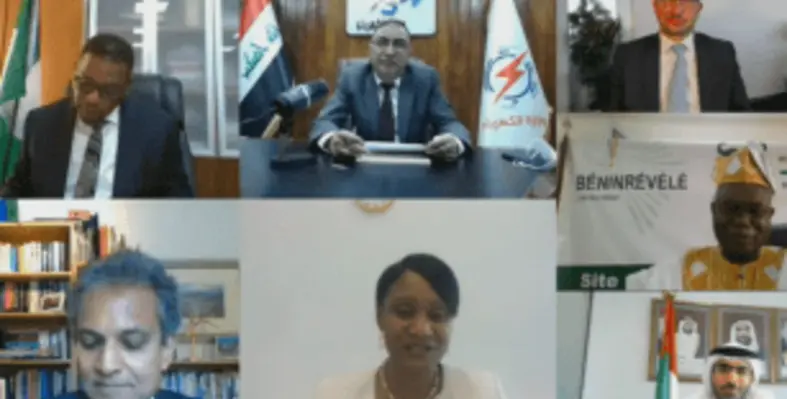Siemens Energy held a MEA Week virtual conference in partnership with the DIHK, Ghorfa, GMIS and Masdar, from 19-21 October 2020, to drive forward the sustainability and decarbonisation agenda at a defining moment for the energy industry
Entitled ‘Shaping the Energy of Tomorrow’, the event featured a world-class speaker line-up including regional ministers, CEOs, energy and finance industry leaders as well as Siemens Energy experts, with themes for the three days being Transformation, Innovation and Sustainability.
The conference started with a keynote address from Damilola Ogunbiyi, the CEO and special representative of the UN Secretary-General for Sustainable Energy for All (SEforALL), who spoke about the impact that energy access has on people’s lives.
Her impassioned speech touched on the importance of access to sustainable and clean energy as the keys to unlock a prosperous future for billions of people around the world. She acknowledged that the COVID-19 pandemic has resulted in an incredible response in terms of innovation and life-saving electricity connections for health centres across Africa and Asia that otherwise struggle with large energy access.
“Countries need to pursue a ‘recover better’ strategy that invests in clean energy, can benefit from increased GDP, greater energy provision, job creation and improved agriculture, gender and health outcomes,” Ogunbiyi said.
“This strategy should focus on integrated, reliant energy transitions that accelerate the pace of progress on access, prioritising energy efficiency and supporting faster growth of renewables,” she added.
A panel session moderated by John Defterios, CNN’s Business Emerging Markets editor, explored the challenges that the energy industry is facing as we advance towards greater sustainability, innovation and ultimately the transformation of the energy landscape. We are in the midst of a paradigm shift, moving away from fossil fuels and toward a more diverse energy mix including hydrogen and nuclear energy. The session also highlighted the importance of interim solutions while we make that shift to renewables.
Speakers included Masdar’s CEO Mohamed Al Ramahi, National Grid Saudi Arabia’s CEO Ibrahim Al Jarbou and the International Renewable Energy Agency (IRENA) director general Francesco La Camera.
“The energy world is very complex, and we cannot tackle it with a simplistic approach. It requires optionality and diversity of solutions,” commented Siemens Energy CEO, Christian Bruch.
“As we transition to a more sustainable energy landscape, it’s important to offer interim solutions and look into changing the conditions. Renewables will play an essential role of course, but the truth of the matter is that we still need gas, and the shift in energy dynamics will take time,” he added.
The second panel of the day, entitled “Energising societies to enable successful and sustainable growth,” touched on the importance of government and private sector partnerships to address the energy transition. There are still 850 million people worldwide without reliable access to electricity, and addressing that will require government initiatives and an adjustment of policies to encourage investment.
In a keynote address, Siemens Energy’s EVP Generation, Karim Amin, emphasised the need to eradicate energy inequality and unreliability around the world, especially in the Middle East and Africa.
“There are still today areas that are suffering from significant (energy) shortcomings in the provision of access to electricity, not only in rural areas but in capitals and major cities. Africa is home to 17% of the world’s population but accounts for just 4% of global investment in electric energy. We need to act now to eradicate such energy inequality,” Amin said.
Distinguished panellists discussed the various roadmaps and policy changes their countries are undertaking to meet their need for electrification and spur the energy transition. One key point was the need to provide clear regulation to encourage and attract investors.
“Governments need to become even more ambitious... and recognise all that technology that innovation and entrepreneurship are offering us. So what is really needed is a comprehensive, legal regulatory framework for investment,” ACWA Power’s president and chief executive Paddy Padmanathan said.
“It is absolutely essential to attract the right partners, and also it gives the confidence for us to make the very significant capital investments,” he added.
Siemens Energy’s managing director for the Middle East, Dietmar Siersdorfer concluded the session saying that to achieve long-term successful energy transition it has to be inclusive for all the countries and communities, and should be customised to meet national needs.
The last session of the day, entitled, “Financing tomorrow’s energy systems to realise the potential of sustainability” focused on the importance of holistic and competitive financing models that would enable the shift towards more sustainable energy systems.
“Opportunities abound but so does competition. There need to be more innovative and cost competitive financing solutions to be able to cope with this competition,” said Niall Hannigan, CFO of Masdar.
Maria Ferraro, Siemens Energy’s CFO, concluded the first day by emphasising the need to work together and collaborate in order to achieve a successful energy transition.












